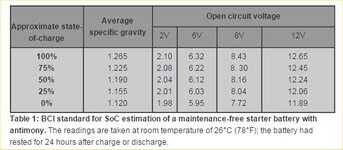jonandshell
Free Member
Not sure, I will have to ask our battery bloke next time I see him!Is it true that Gel cell batteries are not as prone to sulfation as wet lead acid.
I am sure you can't desulphate then though. The gel won't support the high voltage and current flow required for a desulphation charge.
Under heavy currents and heat, the gel bubbles and electron movement becomes slow. This is irreversible.
That is why gel batteries must be charged at a slower rate than open lead acid to avoid permanent battery damage.



